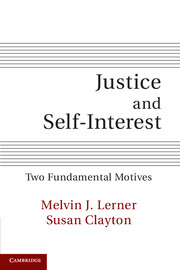Book contents
- Frontmatter
- Contents
- List of Figures and Tables
- Preface
- 1 Contesting the Primacy of Self-Interest
- 2 Why Does Justice Matter? The Development of a Personal Contract
- 3 Commitment to Justice: The Initial Primary Automatic Reaction
- 4 Explaining the Myth of Self-Interest
- 5 Defining the Justice Motive: Reintegrating Procedural and Distributive Justice
- 6 How People Assess Deservingness and Justice: The Role of Social Norms
- 7 Integrating Justice and Self-Interest: A Tentative Model
- 8 Maintaining the Commitment to Justice in a Complex World
- 9 Bringing It Closer to Home: Justice in Another “American Tragedy”
- 10 Emotional Aftereffects: Some Negative Consequences and Thoughts on How to Avoid Them
- References
- Author Index
- Subject Index
4 - Explaining the Myth of Self-Interest
Published online by Cambridge University Press: 03 May 2011
- Frontmatter
- Contents
- List of Figures and Tables
- Preface
- 1 Contesting the Primacy of Self-Interest
- 2 Why Does Justice Matter? The Development of a Personal Contract
- 3 Commitment to Justice: The Initial Primary Automatic Reaction
- 4 Explaining the Myth of Self-Interest
- 5 Defining the Justice Motive: Reintegrating Procedural and Distributive Justice
- 6 How People Assess Deservingness and Justice: The Role of Social Norms
- 7 Integrating Justice and Self-Interest: A Tentative Model
- 8 Maintaining the Commitment to Justice in a Complex World
- 9 Bringing It Closer to Home: Justice in Another “American Tragedy”
- 10 Emotional Aftereffects: Some Negative Consequences and Thoughts on How to Avoid Them
- References
- Author Index
- Subject Index
Summary
It should be strikingly obvious at this point that the findings just reviewed are inconsistent with the prevailing contemporary view that manifestations of self-interested motives appear as the automatic response and shape subsequent judgments of deservingness and justice (see, e.g., Epley and Caruso, 2004; Moore and Loewenstein, 2004; Skitka et al., in press). The evidence is clear: justice imperatives in predictable circumstances automatically influence people's thoughts, feelings, and behavior. To put it baldly, there is clear and compelling evidence that egocentric and egoistic reactions are not invariably the primary automatic dominating influence. This raises the question of exactly when and how self-interested motives actually influence people's judgments of deservingness and reactions to injustice.
An important step in this ambitious project consists of critically reexamining examples of the kind of research findings that are typically employed to provide supporting evidence for these self-interest dominated theories. Do they confirm the central role of self-interest, or do they demonstrate certain methodological and interpretive shortcomings that undermine their conclusions? A reexamination of evidence that is typically cited to infer the effects of egoistic motives will be the first step in answering those questions. Upon closer examination, do those findings actually reveal people automatically and preconsciously framing, modifying, or biasing their judgments of deservingness and justice to fit their self-interested purposes?
We will not attempt an exhaustive review of the extensive array of experiments in the literature. The alternative adopted here will focus on highly cited or prototypical experiments for critical reevaluation.
- Type
- Chapter
- Information
- Justice and Self-InterestTwo Fundamental Motives, pp. 59 - 97Publisher: Cambridge University PressPrint publication year: 2011

